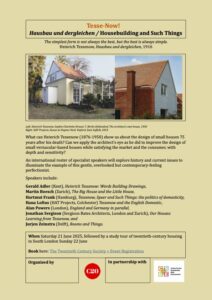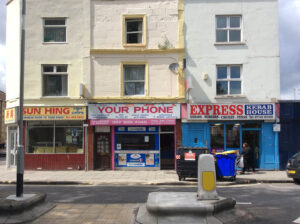CSBE events
TESSE-NOW! Saturday 21 June 2025
Housebuilding and Such Things – An international symposium on Heinrich Tessenow.
organised by the Twentieth Century Society – in partnership with the Centre for the Sustainable Built Environment
What can Heinrich Tessenow (1876-1950) show us about the design of small houses 75 years after his death? Can we apply the architect’s eye as he did to improve the design of small vernacular-based houses while satisfying the market and the consumer, with depth and sensitivity?
An international roster of specialist speakers will explore history and current issues to illuminate the example of this gentle, overlooked but contemporary-feeling perfectionist.

The series of online CSBE conversations are meant to stir debate over some of the most significant challenges to cities.
Green and blue spaces are permanently under pressure, competing with development and new needs of urban dwellers. We offer two innovative visions of urban and peri-urban green infrastructure for this century, both co-designed with users.
CSBE Conversation 1 – ADVANCING MODELS OF URBAN AND PERIURBAN GREEN INFRASTRUCTURE – 2 presentations and a debate – Wednesday March 26, 2025
Green Belt 2.0 – MADDY LONGHURST
R-URBAN and food waste circular economy – PUBLIC WORKS / ANDREW BELFIELD
The series of online CSBE conversations are meant to stir debate over some of the most significant challenges to cities.
This conversation focuses on climate-responsive approaches to make cities liveable in the age of climate change.
CSBE Conversation 2 – WILL WATER AND SHADE SAVE CITIES? – Tuesday April 29, 2025
How effective is water to cool urban spaces? – Professor SANDA LENZHOLZER, WAGENINGEN UNIVERSITY
Shade the UK: from the theory of change to action – POLLY TURTON, HEAD OF CLIMATE AND PUBLIC HEALTH, SHADE THE UK.
The series of online CSBE conversations are meant to stir debate over some of the most significant challenges to cities.
Urban green spaces present as critical sites for exploring natural and cultural heritage. Here we look at how history and literature can help excavate the complex and contested stories of such places, addressing questions of access and design as they intersect with issues of physical health, emotional wellbeing and political awakening.
CSBE Conversation 3 – IS THE IDEA OF GREEN PUBLIC SPACE CHANGING? – Wednesday May 28, 2025
Modern City Parks Across the Globe: Exploring the park as a landscape of health from mid-1800s to the present day and beyond – Professor KAREN JONES, UNIVERSITY OF KENT

Fair access to healthy food is a contested right. Whilst global food production is sufficient to meet current needs, challenges surround everyday access. For the most vulnerable in society, increasing food insecurity reflects forms of disempowerment that have become embedded in political and economic logic. There are many diverse stakeholders involved in the fight for the right to healthy food, demonstrating the intersectionality of the ‘food issue’, and its relationships with associated issues of health, education, community, employment, home and climate insecurity.
Cities are increasingly focused on designing food policies which address the multiple challenges related to food systems, including food education, production and procurement, health, and climate change. We argue that the Right to Food principle must become the cornerstone of such policies working cohesively with partners involved in action. Urban food policies and programmes, and food partnerships in the UK and Europe offer good models but more must be done together to ensure that access to healthy food for all becomes a human right embedded in policy.
This symposium brings together third sector, local government and academic speakers to share ideas and best practice in Right to Food and food policy initiatives, building on the work being done across the channel by 3i University Network cross-channel partner cities such as Lille, France, and Ghent, Belgium. The symposium explores the barriers, tensions, relationships and achievements in acting through three themes: food poverty, urban food policies and spatial aspects related to it. Attendees will then use the change framework (mapping and discussing transformational triggers formed by institutions, interests and ideas), in a workshop session to drive forward a localised policy agenda.
You can watch a film on the event at the link below:

- What are the most pressing issues facing our region in terms of climate emergency?
- How can we grow resilience in our urban spaces and better engage communities to create positive environmental futures?
- What are the conceptual and practical ways in which expertise in the Arts and Humanities can be used to help?
The Centre for the Sustainable Built Environment at the University of Kent is pleased to host a workshop on climate emergency that addresses these three connected questions. We invite any stakeholders and interested parties from the region – government, charity, public-facing – to join the discussion!
You can watch a video of the event at the link below

Heritage buildings and sites are a key asset for the UK. Their cultural and historical value does not only lie in the embodiment of a collective place-based memory and identity, but also in the contribution to the architectural quality of places and the local economies. While the synergies between historical buildings and sites, and economic development are recognised at a policy level, its social value is more difficult to acknowledge. The power of heritage sites to enhance community identity and attachment to place, or to contribute to the wellbeing of residents and visitors is difficult to quantify.
Furthermore, the definition of heritage is evolving and, if seen through the lens of social value, can encompass marginal, everyday sites. It can substantially contribute to the making of local identities that are rarely classified as heritage. As a result the social value is often ignored in their designation and management. There are exceptions. For example, Brixton Market has been recently listed following pressure from local residents. Also, importantly, new concepts and methodologies to redefine the value of heritage have emerged such as everyday heritage, which defines sites that rather that receiving official recognition because of their historical significance are places that matter to people, and possess existential and affective meanings. Likewise, there have been attempts to demonstrate the real whole value of heritage sites using tools such as Social Return on Investments, which can quantify social benefits.
The county of Kent offers many spaces for the exploration of such new approach to heritage. In addition to areas of high heritage significance, it is also home to many areas with multiple levels of deprivation. The post-industrial towns of Chatham, Margate and Ramsgate, offer rich site for exploring the social value of its distinct, yet unrecognised urban landscapes and architecture.
The symposium, which is an initiative of the Centre for the Sustainable Built Environment (CSBE) at the University of Kent, aims to explore these latest concepts. The event is designed not only to generate debate amongst participants, but to reach and sensitise local stakeholders too. To this end, representatives from local authorities and local societies and groups will be invited and the format of the event will include presentations, chaired debates and practical workshop sessions.
You can watch a video of the event at the link below
A workshop on climate responsive urbanism, which will highlight interdependent built form effects that are often overlooked in the broader discussion on sustainable urban development.
Professor, Dr. Peter J. Crank from the University of Waterloo presents an exploration of the intersection of schizophrenia and atmospheric science in the context of an urbanizing world – Climate and (mental) health in cities.
Dr Julie Futcher organises the Urban Climate Walking Tour from the campus to the centre of Canterbury
You can watch a video of the event at the link below: